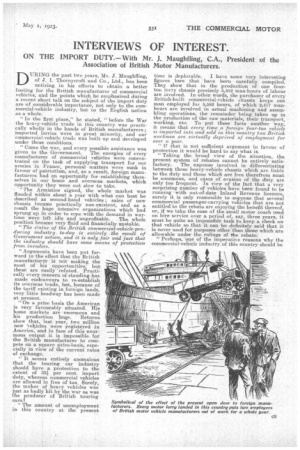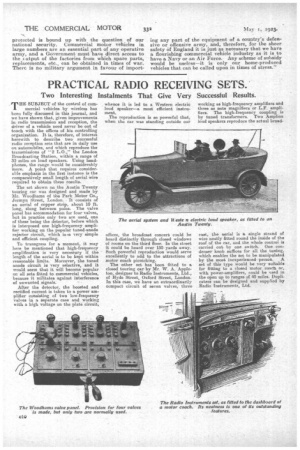INTERVIEWS OF INTEREST.
Page 9

Page 10

If you've noticed an error in this article please click here to report it so we can fix it.
ON THE IMPORT DUTY.—With Mr. J. Maughfling, C.A., President of the Association of British Motor Manufacturers.
DURING the past two years, Mr. J. Maughfling, of J. I. Thornycroft and Co., Ltd., has been untiring in his efforts to obtain a better footing for the British manufacturer of commercial vehicles; and the points which he emphasized, during a recent short talk on the subject of the import duty are of considerable importance, not only to the commercial-vehicle industry, but to the English nation as a whole.
" In the first place," he stated, " before the War the heavy-vehicle trade in this country was practically wholly in the hands of British manufacturers ; imported lorries were in great minority, and our commercial-vehicle trade was built up and developed under these conditions.
"Came the war, and every passible assistance was given to the Government. The energies of every manufacturer of commercial vehicles were concentrated on the task of supplying transport for our armies in France., personal matters were sunk in favour of patriotism, and, as a result, foreign manufacturers had an opportunity for establishing themselves in our home and overseas markets, which opportunity they were not slow to take.
The Armistice signed, the whole market was flooded within about a year with what can best be described as second-hand vehicles sales of new chassis became practically non-existent, and as a result the huge intensive organizations which had sprung up in order to cope with the demand in war time were left idle and unprofitable. The whole position became very fluid and financially unstable.
"The status of the British commercial-vehicle-producing industry, to-day is entirely the result of Government action, and it is only fair and just that the industry should have some means of protection from invaders.
"Arguments have been put forward to the effect that the British manufacturer is not making the most of his opportunities; but these are easily 'refuted. Practically every concern of standing has made endeavours to re-establish its overseas trade, but, because of the tariff existing in foreign lands, very little headway has been made at present.
"On a price basis the American is very favourably situated. His home markets are enormous and hies production huge. Returns show that, last year. two million new 'vehicles were registered in America, and in face of this enormous output it is impossible for the British manufacturer to coinpete on a square price-basis, especially in view of the current rates of exchange.
"It seems entirely anomalous that the touring car industry should have a protection to the extent of 331 per cent, import duty, whereas commercial vehicles are allowed in free of tax. Surely, the maker of heavy vehicles was just as badly hit by the war as was the producer of British touring cars?
"The amount of unemployment in this country at the present time is deplorable. I have some very interesting
figures here that have been carefully compiled. They show that in the production of one fourton lorry chassis precisely 5,562 man-hours of labour are involved. In other words, the purchaser of every British-built commercial-vehicle chassis keeps one man employed for 5,582 hours, of which 2,417 manhours are involved in actual machining and assembling operations, the remainder being, taken up in the production of the raw materials, their transport, working, etc. To put thesefacts another way, it means that .every time a foreign four-ton vehicle is imported into and sold in this country two British workmen are virtually deprived of employment for over a year.
"IF that is not sufficient argument in favour of protection it would be hard to say what is.
"Taking the broad view of the situation, the present system of rebates cannot be entirely -satis factory. The expense involved in differentiating between those heavy-vehicle chassis which are liable to the duty and those which are free therefrom must be enormous, and cases of evasion of the duty are only too frequent. In view of the fact that a very surprising number of vehicles have been -found to be running with out-of-date Inland Revenue licences, surely it is only reasonable to .suppose that several commercial passenger-carrying vehicles that are not entitled to the rebate are enjoyallg the benefit thereof, or, if we take the case of the small motor coach used on hire service over a period of, say, three years, it must be quite an impossible task to keep a Check on that vehicle so that it can be definitely said that it is never used for purposes other than those which are allowable under the rulings of the rebate.
"Perhaps, one of the imperative reasons why the commercial-vehicle industry of this country should he protected is bound up with the question of our national security. Commercial motor vehicles in large numbers are an essential part of any operative army, and a Government must have direct access to the c•utput of the factories from which spare parts, replacements, etc., can be obtained in times of war. There is no military argument in favour of import
jug any part of the equipment of a country's defensive or offensive army, and, therefore, for the sheer safety of England it is just as necessary that we have a flourishing commercial vehicle industry as it is to have a Navy or an Air Force. Any scheme of subsidy would be useless—it is only our home-produced vehicles that can be called upon in times of stress."
































